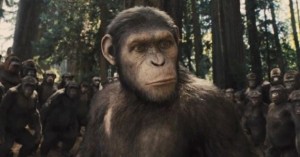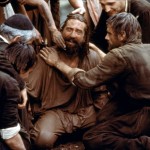 Terry Notary is the man behind the mask in the new film Dawn of the Planet of the Apes.
Terry Notary is the man behind the mask in the new film Dawn of the Planet of the Apes.
He is a Hollywood “movement coach” and this fascinating article from London’s Daily Telegraph goes into detail of his work. Notary work in a “mocap” suit– mocap being short for “motion capture”. This is the technology that created Gollum in Lord of the Rings and which is used increasingly in fantasy and science fiction films to create realistic mythical beasts or humanoid animals.
The actor wears a suit with dots of light attached. His face has small dots of lights and he wears a helmet with a camera stuck in front of his face. The main cameras and the helmet camera film everything he does. The dots of light become moving reference points upon which the computer animators construct the animated character–Gollum in LOTR and the apes in the new movie. Think of the dots as a moving armature on which a sculptor–in this case the animator–fleshes out the creation.
Notary began as a gymnast, then became a circus performer and found his way into movies first working with other gymnasts as the Who’s of Whoville in The Grinch Who Stole Christmas.
Especially interesting is the amount of depth Notary puts into the acting. They’re not just wearing monkey suits and jumping around.
For Dawn, however, Notary trained not actors but stuntmen. Many were adept in parkour, a kind of urban gymnastics that involves leaping off balconies and down stairwells: “I wanted men that were stronger than average,” he says. But his training – two hours a day for five weeks – didn’t focus on their athleticism. For Notary, the most important goal was to connect with one’s “inner ape”, a process he describes in the language of yoga or meditation.
“Lesson one is just breathing,” he says. “Just sit back into yourself and let your mind soften so that it becomes a guide rather than a control. It’s about being grounded and connected and honest, open and vulnerable. Let go of all the cerebral checks and judgments that block our natural state…”
Lesson two is relearning how to stand up from a sitting position. Humans have a jerky way of bending first, whereas apes rise to their feet without effort. “Apes are very economical with their movement,” he says. “People come to my class feeling like they need to do something all the time – to do an ape impersonation. But you don’t do, in my class. You undo. It’s a process of deconditioning.”
This hi-tech process sounds very similar to mask acting. In acting class we had sessions in using masks to act. You had to take a mask out of a box, wear it and allow the mask to determine your character–your body language, improvised speech, everything. It was a genuinely weird experience because the mask really did take you over if you allowed. Notary and his team do more than wear a monkey suit. They go into ape mode…
“What we found works is when people embody the ape, but show this underlying intelligence through the eyes,” he says. “You’re still rooted and instinctive, but you let the mind come in and rein the instinct back, like a leash.”
Not that reining back is easy, even when the cameras stop rolling. “All the guys were doing it after a day on set,” he says, laughing. “Like, ‘Dude, you’re still in the ape zone, look at the way you’re drinking your beer!’ ”
Is there a spiritual lesson for today? The Christian acting teacher would say, “As you adopt your character remember that the good actor becomes that person for a time. Their personality is transformed from the deepest level outward. The poor actor simply dons a costume and pretends by walking a certain way and mimicking a voice. So it is with the Christian life. We are called to “put on Christ” and to “grow up into the full humanity of Christ Jesus”. The phony Christian just pastes on certain outward behaviors. The genuine saint is transformed from the deepest level of his personality outward….and that…like acting is very hard work which can only be done with the gift of grace.”
Read the whole article about Terry Notary here.











